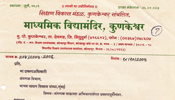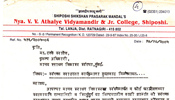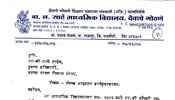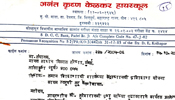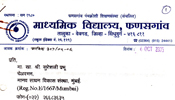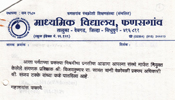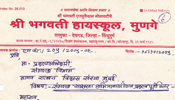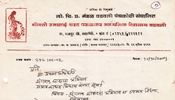Computer Literacy Campaign in schools
BACKGROUD
With the digital revolution taking the world by storm, it's only natural that school authorities start thinking about integrating technology into the classroom. In order to help schools in its target area in training rural students and thereby making them beneficiaries of both the knowledge explosion and the communications bonanza, MSVS launched a Computer Literacy Campaign with the help of Ford Foundation, USA in 2002.
The first step in the process of technology integration is teachers’ education. Children spend countless hours attached to some form of technology, and until teachers have the same understanding of technology available and how they can use it to open new and exciting educational vistas for students, they are missing valuable opportunities to reach their students.
At that time, the State Government had developed a three years curriculum in computer education for the students of 8th, 9th and 10th standard. Many schools in the target area raised resources for installing computer labs for the training their students. However, it was discovered that teachers were deficient in the skill and knowledge to handle the said syllabus effectively. Resultantly the computers in the schools labs became useless. The schools were not in a position to install Internet connection that should complement the purpose of computer education.
The MSVS undertook a study of the above situation and developed a project proposal. The project was aimed at strengthening the school computer laboratories, guiding and training the potential school teachers to implement the government curriculum for the students of 8th, 9th and 10th standard in selected schools in the two districts mentioned above. The title of the project was “Computer Literacy Campaign”. The Ford Foundation, USA, appreciated the project and gave financial support for the same. The project was implemented over a period of three and half years. Though MSVS kicked off the campaign in April’ 2002, it gained full steam only in September 2002. The equipment components of the campaign project, which was to come from the Member of Parliament Local Area Development (MPLAD) Fund of Ratnagiri/Sindhudurg took a few months. The process of identifying the target schools and the instructors also took some time. Hence the campaign period got extended up to to 31st October’ 2005. MSVS thus implemented the Computer Literacy Campaign of Ford Foundation (USA) from 1st April’ 2002 to 31st October’ 2005.
At that time, the State Government had developed a three years curriculum in computer education for the students of 8th, 9th and 10th standard. Many schools in the target area raised resources for installing computer labs for the training their students. However, it was discovered that teachers were deficient in the skill and knowledge to handle the said syllabus effectively. Resultantly the computers in the schools labs became useless. The schools were not in a position to install Internet connection that should complement the purpose of computer education.
The MSVS undertook a study of the above situation and developed a project proposal. The project was aimed at strengthening the school computer laboratories, guiding and training the potential school teachers to implement the government curriculum for the students of 8th, 9th and 10th standard in selected schools in the two districts mentioned above. The title of the project was “Computer Literacy Campaign”. The Ford Foundation, USA, appreciated the project and gave financial support for the same. The project was implemented over a period of three and half years. Though MSVS kicked off the campaign in April’ 2002, it gained full steam only in September 2002. The equipment components of the campaign project, which was to come from the Member of Parliament Local Area Development (MPLAD) Fund of Ratnagiri/Sindhudurg took a few months. The process of identifying the target schools and the instructors also took some time. Hence the campaign period got extended up to to 31st October’ 2005. MSVS thus implemented the Computer Literacy Campaign of Ford Foundation (USA) from 1st April’ 2002 to 31st October’ 2005.
LOCATION
Two costal districts of the State of Maharashtra namely Ratnagiri and Sindhudurg were selected for the campaign. In all 22 schools from three talukas (blocks) of Ratnagiri district & one taluka of Sindhudurg districts were identified. The distribution of the school was as follows:
Ratnagiri district
Sindhudurg district
Under this project, every school was provided with two computers and a printer to strengthen their computer laboratories. Along with it, an instructor was appointed in each of the targeted schools for imparting training to the students and run the campaign. They were given an introductory training, curriculum training and training for imbibing the habit of using Internet among their students. Each of these selected schools was provided with electricity stabilizer so as to get expected efficiency from the computer laboratories. They were also given separate telephone connections for Internet connectivity.
Ratnagiri district
- Sangameshwar taluka- four schools
- Lanja taluka- three schools
- Rajapur taluka- seven schools
Sindhudurg district
- Devgad- eight schools
Under this project, every school was provided with two computers and a printer to strengthen their computer laboratories. Along with it, an instructor was appointed in each of the targeted schools for imparting training to the students and run the campaign. They were given an introductory training, curriculum training and training for imbibing the habit of using Internet among their students. Each of these selected schools was provided with electricity stabilizer so as to get expected efficiency from the computer laboratories. They were also given separate telephone connections for Internet connectivity.
PURPOSE
The aim of the campaign was:
The syllabus selected was approved by Education Ministry, Govt. of Maharashtra. For the campaign MSVS made agreements with the schools authorities where in they agreed to provide three to four instructions periods (35 minutes each) per day for computer training to their students, and also allowed to have computer practice before & after school hours, under their own responsibility. The schools agreed to provide necessary infrastructure including the electricity.
- To make students of Std. VIII, IX and X computer literate and to train them so that they are ready to use the Information Technology to their advantage
- To teach rural students how to use Internet and other IT enabled services in order to bring the vast knowledge to their doorstep
- To encourage use of Internet for communication between students, parent and teachers of different schools
- Establish computer as community resources.
The syllabus selected was approved by Education Ministry, Govt. of Maharashtra. For the campaign MSVS made agreements with the schools authorities where in they agreed to provide three to four instructions periods (35 minutes each) per day for computer training to their students, and also allowed to have computer practice before & after school hours, under their own responsibility. The schools agreed to provide necessary infrastructure including the electricity.
ACTIVITIES TAKEN UNDER THIS PROJECT
- Paint, WordPad, Calculator, MS Word, Excel, Power Point, practices basis of textbook.
- Typing exercises in Marathi and English, competition of typing speed. Impact of this is 20-22 students learned typing and performed as WPM.
- Competition of drawing with paint brush program
- Chart making competition on information about computers
- Quest competition on general knowledge
- Marathi typing
- English essay and letter type in computer
School students were periodically evaluated to gauge progress.
IMPACT
Computer awareness and interest has been created not only among the students of the schools where the project was executed but also among teachers, clerical staff of the schools and the people staying in the neighborhood of the schools. This spill over effect seems to be quite impressive as has been communicated by the head teachers of the targeted schools and some of the residents of the selected villages in which the schools are located.
Students from both primary and secondary levels learned how to use computers for their educational purpose. Students from 8th and 9th standard used “Scour Plus” educational software for their Algebra, Geometry and Science subjects. It was observed that the use of this educational software, enhanced performance of the students in the aforesaid subjects. Students also used computers to write their essay and letters. They learned how to communicate with each other through Internet and how to collect various types of information by using Internet facility, though with technical limitations of the Internet facility in the region.
Action plan was prepared as per syllabus for the instructors & training camps were also arranged for them to improve their performance at the beginning of this campaign. This brought in more rigorousness in implementation of the plan. All instructors also were found getting fulfillment.
Special batches of awareness camps were arranged for the literate women, parents of the students, girls & students of the neighboring schools where the project was being executed.
Special batches of awareness camps for the parents of students played an important role. Though most of the parents are illiterate they know the importance of education and hence send their children to the schools. But initially there was reluctance to send their children for extra practical periods, on holiday camps & in special classes organized during the vacation period. But the awareness camps brought good change among them as our instructors, schoolteachers & honorary experts attached with the MSVS, present in the camps, could answer their questions, dispelled doubts. They emphasized how computer knowledge was important for their children’s’ careers.
Students from both primary and secondary levels learned how to use computers for their educational purpose. Students from 8th and 9th standard used “Scour Plus” educational software for their Algebra, Geometry and Science subjects. It was observed that the use of this educational software, enhanced performance of the students in the aforesaid subjects. Students also used computers to write their essay and letters. They learned how to communicate with each other through Internet and how to collect various types of information by using Internet facility, though with technical limitations of the Internet facility in the region.
Action plan was prepared as per syllabus for the instructors & training camps were also arranged for them to improve their performance at the beginning of this campaign. This brought in more rigorousness in implementation of the plan. All instructors also were found getting fulfillment.
Special batches of awareness camps were arranged for the literate women, parents of the students, girls & students of the neighboring schools where the project was being executed.
Special batches of awareness camps for the parents of students played an important role. Though most of the parents are illiterate they know the importance of education and hence send their children to the schools. But initially there was reluctance to send their children for extra practical periods, on holiday camps & in special classes organized during the vacation period. But the awareness camps brought good change among them as our instructors, schoolteachers & honorary experts attached with the MSVS, present in the camps, could answer their questions, dispelled doubts. They emphasized how computer knowledge was important for their children’s’ careers.
PROBLEMS ENCOUNTERED
- Electricity problem, load shading particularly in the period of 2004-05 in rural Maharashtra
- Weak telephone network
- Weak communication between instructor & coordinator, particularly at the initial period of the project
- Technical (hardware/software) faults remaining unattended for long period
Student Issues: Most students hailed from economically backward & socially marginalized sections of the society, living in the remote rural areas. Their parent’s main occupation was farming. They either tilled their own tiny plots of land or worked as farm labor. The students lacked communication skills, stage daring, confidence and knowledge of English.
ACTION TAKEN TO ADDRESS THIS ISSUES
Both the districts were and are going through the load –shading for extended periods during the daytime. Sometimes it became very difficult to take practical on computer due to non-availability of power for a whole day. There was no temporary solution for this problem. The practical sessions and awareness camps were arranged on alternative time in the day, even in nights.
Obtaining telephone connections was a huge problem. This was resolved following sustained follow up from the MSVS and its Chairman, Mr. Suresh Prabhu, former MP & former Minister in the Central Government.
Since the region is hilly, transport and telephone services are quite weak. Mobile telephone services are also not provided in the villages away from the national highway. This resulted in weak communication between the coordinator and the instructor. A monthly time table was prepared and rigorously implemented in which the coordinator organized meetings of the instructors at different schools. In addition one of the instructors was given responsibility of locally coordinating the work of all the instructors, which he did at a meeting held once in fortnight, individually or in group. The MSVS office monitored the entire work and kept continuous contacts with the school authorities and the instructors. The field officers of the Jan Shikshan Sansthan, Sindhudurg of the MSVS, also extended their support to develop communication, supervision/guidance in the project.
The computer repair and service facilities were not accessible to the targeted schools very easily. The major towns are at long distances and the technicians were reluctant to go to these villages. Every month surveys were conducted in the targeted schools and lists of technical problems in hardware as also in software were recorded. A technician was hired for four/five days and was taken on the sight at a stretch. This was done periodically and the required servicing & repairing was done. It was cost effective too. Parents were called for seminars/awareness camps arranged by the schools, the instructors & the MSVS. The problems were discussed and solutions were arrived at. The importance of computer education for their children’s bright future & career was emphasized. Schoolteachers meetings were organized to emphasize the importance of English.
Group discussion among the students and essay writing competitions were held. Simple topics, subjects on self development, use of computers etc. were given to the students for discussion and were encouraged to express their opinions on the subjects. Quiz & other competitions like drawing, crafting etc. were arranged for them to overcome the problems of stage daring, self-confidence & communication.
Obtaining telephone connections was a huge problem. This was resolved following sustained follow up from the MSVS and its Chairman, Mr. Suresh Prabhu, former MP & former Minister in the Central Government.
Since the region is hilly, transport and telephone services are quite weak. Mobile telephone services are also not provided in the villages away from the national highway. This resulted in weak communication between the coordinator and the instructor. A monthly time table was prepared and rigorously implemented in which the coordinator organized meetings of the instructors at different schools. In addition one of the instructors was given responsibility of locally coordinating the work of all the instructors, which he did at a meeting held once in fortnight, individually or in group. The MSVS office monitored the entire work and kept continuous contacts with the school authorities and the instructors. The field officers of the Jan Shikshan Sansthan, Sindhudurg of the MSVS, also extended their support to develop communication, supervision/guidance in the project.
The computer repair and service facilities were not accessible to the targeted schools very easily. The major towns are at long distances and the technicians were reluctant to go to these villages. Every month surveys were conducted in the targeted schools and lists of technical problems in hardware as also in software were recorded. A technician was hired for four/five days and was taken on the sight at a stretch. This was done periodically and the required servicing & repairing was done. It was cost effective too. Parents were called for seminars/awareness camps arranged by the schools, the instructors & the MSVS. The problems were discussed and solutions were arrived at. The importance of computer education for their children’s bright future & career was emphasized. Schoolteachers meetings were organized to emphasize the importance of English.
Group discussion among the students and essay writing competitions were held. Simple topics, subjects on self development, use of computers etc. were given to the students for discussion and were encouraged to express their opinions on the subjects. Quiz & other competitions like drawing, crafting etc. were arranged for them to overcome the problems of stage daring, self-confidence & communication.
TAKEAWAYS
As compared to urban area rural students are still deprived of need base education, computer training etc. They are totally unaware about the computer and its application/ information & technology.
School authorities are also not capable of implementing such projects in their schools due to financial problems. The MSVS/FF project helped to overcome the lacuna to a great extent in at least the targeted schools. With the help of the project MSVS could reach to the needy people/elder (college) students, the parents of the school students of this remote area and generate awareness about the computer education.
This should serve as a demonstration and lead to multiplier effect in near future. But that requires integrated approach inviting community participation and sharing (may be token at the beginning) of the cost of the project. The MSVS will be working in this area on this line.
School authorities are also not capable of implementing such projects in their schools due to financial problems. The MSVS/FF project helped to overcome the lacuna to a great extent in at least the targeted schools. With the help of the project MSVS could reach to the needy people/elder (college) students, the parents of the school students of this remote area and generate awareness about the computer education.
This should serve as a demonstration and lead to multiplier effect in near future. But that requires integrated approach inviting community participation and sharing (may be token at the beginning) of the cost of the project. The MSVS will be working in this area on this line.
OBJECTIVES ACHIEVED
- Computer literacy among the targeted school students, who did not get necessary computer education imperative in this IT driven world
- The students have started using computer as learning aid
- Computer literacy awareness was achieved among the rural society through awareness camps
- The project also worked as a pilot effort in computer literacy
- The school authorities including the head-teachers, teachers and the parents understood the importance and need based mechanism of such a project so that in future they could incorporate the project objectives in their regular programs
- The project has also helped the MSVS to reach to the grass root of the village population and understand the felt need of the society in the area of computer literacy
- It also helped integrating other activities of the MSVS such as vocational education to the youngsters, strengthening the transformation centers in the vicinity of a group of 10 to 12villages (Parivartan Kendras), heath education to the village women, education on the medicinal plants and other locally available natural resources etc.
TO SUM UP
This three and half year’s exercise was useful to the MSVS in many ways. The MSVS could reach to the 22 groups of villages around the schools selected for the project. Beneficiaries of this project are not only twenty teachers and their schools but also about 2000 students to whom the twenty teachers could give better computer education. The principals of all the concerned schools had conveyed their heartfelt gratitude.
A list of the instructors under the project
| 1 | Mr. V. R. Savant |
| 2 | Mr. A. D. Bedekar |
| 3 | Ms. M. S. Bhogte |
| 4 | Mr. P. D. Mody |
| 5 | Mr. V. K. Shinde |
| 6 | Mr. A. Y. Dixit |
| 7 | Mr. H. S. Pawar |
| 8 | Mr. J. R. Sinkar |
| 9 | Ms. R. Dol |
| 10 | Ms. P. V. Ghag |
| 11 | Mr. A. K. Bargude |
| 12 | Ms. L. R. Bondre |
| 13 | Ms. M. Vibhute |
| 14 | Mr. P. Y. Gayakwad |
| 15 | Mr. M. L. Ghadi |
| 16 | Ms. R. R. Jadhav |
| 17 | Mr. M. D. Rane |
| Gratitude through their letters addressed to the MSVS. | |
| 1 | Ms. S. M. Sawant |
| 2 | Ms. N. S. Dhekne |
| 3 | Ms. K. V. Ghadi |
| 4 | Mr. S. N. Mungekar. |
| 5 | Mr. P. Mahajan. |
A list of the schools identified for the project implementation.
Ratnagiri District
Sindhudurg District
- Lok Vidhyalay, Tulasani, Sangameswar
- Adarsh madhyamaik Vidhyalay, Belar Bk., Sangameswar
- Madhyamik Shramshala, Nive Bk., Sangameswar
- Madhyamik Vidhyamandir, Tamhane, Sangameswar
- RS Berde Vidhyalaya, Sapuche Tale, Lanja
- Shriram Vidhyalay, Veravali, Lanja
- VV Athalye Vidhyamandir, Shiposhi, Lanja
- Shri Kaleswar Vidhyalay, Mur, Rajapur
- US Parulekar Madhyamik Vidhyalay, Rajapur
- Utkarsh Vidhyalay, Shivane Kd., Rajapur
- Late SN Desai Topiwale Vidhyalay, Nanar, Rajapur
- BL Sathe Madhyamik Vidhyalay, Devache Gothane,Rajapur
- Shri Mahakali English School, Navedar, Rajapur
- Arjun Madhyamik Vidhyalay, Karavali, Rajapur
Sindhudurg District
- Madhyamik Vidhyalay, Kunkeswar, Deogad
- Shri Bhagawati Highschool, Munage, Deogad
- SB Rane High school, Narigre, Deogad
- AK Kelkar Highschool, Vada, Deogad
- Mahatma Gandhi Vidhyalay, Talebajar, Deogad
- Madhyamik Vidhyalay, Phanasgaon, Deogad
- Panchkroshi Madhyamik Vidhyalay, Gavane, Deogad
- Korle Dhalavali Madhyamik Vidhyalay, Korle Dhalavali, Deogad








